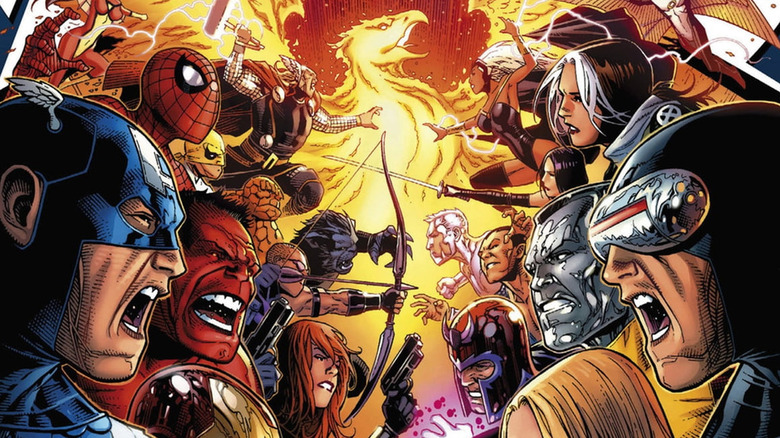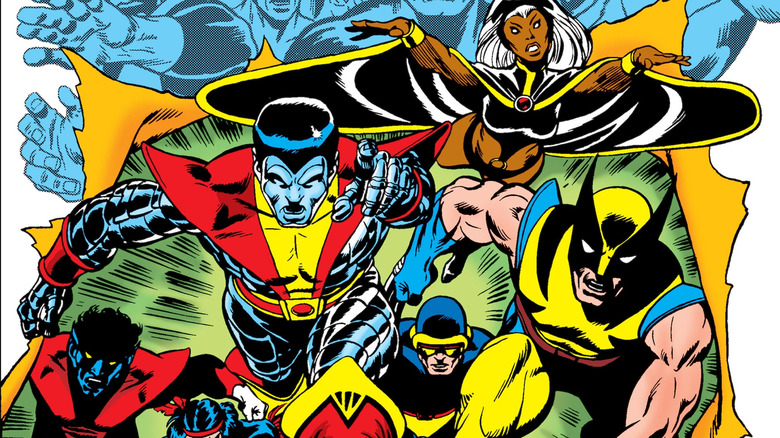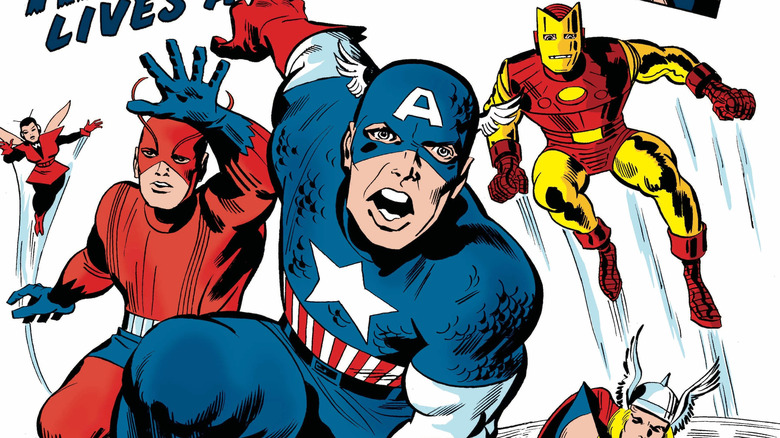Why The Marvel Universe Hates The X-Men - And Loves The Avengers
Historically, the X-Men are one of the most hated superteams in the Marvel Universe. On the other hand, the Avengers are heroes who rarely face the same vitriol or hatred. And, unfortunately, that's something Marvel's mutants have little control over.
The X-Men are on the verge of being rebooted once again as the Krakoan Age, initially spearheaded by writer Jonathan Hickman, will soon come to a close. In its place, a new era begins with "X-Men: From the Ashes." At South by Southwest (SXSW), Marvel Comics revealed key details about the future of the team in a new trailer teasing the upcoming changes. In the video, the X-Men are seen scattered following the fall of the mutant paradise Krakoa, and mutants are said to be more feared than ever before. But for the X-Men, being prejudiced against and scorned isn't exactly a new reality.
Over sixty years since mutants were introduced to the Marvel Universe, they still face hate for merely existing. Since their first appearance in 1963's "Uncanny X-Men" #1 (by Jack Kirby, Stan Lee, Sam Rosen, and Paul Reinman), the X-Men have reflected the real-world fear and resentment experienced by marginalized groups.
Meanwhile, the Avengers, who first banded together the same year, have almost always been regarded as heroes. The team's members often have control over how they look and typically sport non-genetic-based powers. Because of this, Marvel Comics tends to present them as being more relatable to the general public.
Why the Marvel Universe hates the X-Men
For decades, the X-Men have been presented as a metaphor for the Civil Rights Movement, as mutants were seen as different because of their abilities and how they appear due to factors outside their control. Their response to bigotry and hatred is to educate their greatest haters, while the villainous Magneto and his Brotherhood of Evil Mutants originally fought for mutant supremacy and the annihilation of humanity — a mission that angered the already frightened human populace.
When writer Chris Claremont took over "Uncanny X-Men" with artist Dave Cockrum and, later, John Byrne, the X-Men were shaped into more complex heroes who were viewed by society as menaces worthy of extinction despite their efforts to make the world a better place. In this era, prejudice towards mutants runs rampant, as exemplified in Claremont and Brad Anderson's "X-Men: God Loves, Man Kills," one of Marvel's first graphic novels. The story sees mutants dealing with religious hatred as the team is viewed as abominations by god-worshipping zealots. Evil actors seeking mutant erasure also played vital parts in other classic storylines like "The Fall of Mutants," where the government tries to control them through a mandatory registration act and criminalizes those who don't comply, while "X-Men: Days of Future Past" portrays a dystopian timeline where they were nearly entirely eradicated.
The X-Men attempt to change mutant perception in the Krakoan Era, offering humans life-extending medicines in exchange for sovereignty as their own nation. However, hopes of forging a mutually beneficial relationship are tainted by the anti-mutant organization Orchis, which makes the medicines deadly, leading to mutants becoming even more hated. No matter what aid and help they offer to humanity and the world, X-Men are rarely perceived as equal to humans.
Why the Marvel Universe loves the Avengers
Conversely, the Avengers, often called "Earth's Mightiest Heroes," aren't viewed with the same hatred as the X-Men. They're collectively seen as safe heroes who appear more human, relatable, and the pinnacle of what humanity represents. While they face challenges from those who oppose them, the Avengers rarely suffer the same prejudice from the public simply for how they look and what they represent.
While Marvel's mutants can't control who they are or what powers they have, the Avengers mostly can. Captain America signed up to become an enhanced super-soldier to help end World War II; Iron Man designed and built his armor with his genius intellect; and Ant-Man scientifically developed his and Wasp's size-changing abilities. Even a god like Thor is seen as more human than most of the X-Men simply due to his handsome appearance. Heroes like the Hulk, who didn't choose to transform into a monster but instead gained his powers in a freak accident, relate more to the mutants because he doesn't have the same control over his superhero nature as his fellow Avengers — and he's treated much worse by the public because of it.
The Avengers supposedly encompass the best of what a human society can be. The X-Men, with their roster filled with powerful heroes that often dwarf the Avengers' abilities, are hated because mutants often look different and less "normal" than their human counterparts. Unfortunately, the Marvel Universe hating the X-Men and loving the Avengers is a symptom of a significant problem involving prejudice and hatred of what people don't understand. It's also, sadly, a reflection of the real world and how mankind tends to react to race, social hierarchies, and basic differences.


